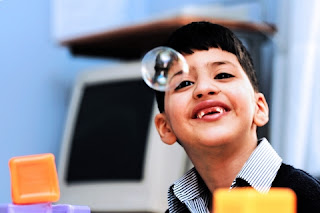
Facts Every Parent Should Know
Nancy Wiseman had a feeling early on that something wasn't quite right with her daughter. When Sarah was 6 months old, she stopped babbling, and by 10 months, she was silent. By 18 months, the increasingly aloof toddler no longer responded to her name, and she resisted being held, kissed, or touched. "I felt that I was losing my child a little more each day," says Wiseman, of Merrimac, Massachusetts. When Sarah wasn't saying any words or even making sounds that resembled words by 20 months, her grandmother, a school psychologist, suspected that the girl might actually be deaf. Instead, Wiseman was devastated to learn that her daughter had autism. "The diagnosis really knocked the wind out of me," she recalls, "but I was relieved to finally know what was wrong."
Although the severity of autism can vary widely, many children with the neurological disorder -- which typically appears in the first three years of life -- have problems speaking, interacting with others, sharing affection, and learning. Thanks to the tireless efforts of parents and advocates, public awareness of autism has grown tremendously since it was first identified in 1943, but it is gaining even more attention today than ever before. Congress has held hearings on the condition. Public-health agencies are spending millions to study it. Researchers at countless universities are racing to find the causes and best treatments.

"There are many unanswered questions," says Alice Kau, Ph.D., an autism expert at the National Institutes of Health, which funded more than $74 million in autism research in 2002, as compared with only $22 million in 1997. Still, researchers are beginning to make progress in unraveling this baffling disorder, and the number of resources available for families is increasing. Here, six facts about autism that every parent should know
1. RATES ARE ON THE RISE
Autism is ten times more common today than it was in the 1980s, according to the Centers for Disease Control and Prevention. An estimated 1 in 88 children (11.3 per 1,000) in this country have autism to some degree. In California, the number of kids with autism in the state's social-services program nearly doubled between 1998 and 2002, surpassing cases of childhood cancer, juvenile diabetes, and Down syndrome. Nationwide, autism strikes three to four times more boys than girls; the rates are about the same for kids of all races.
Although there seems to be an autism epidemic, most experts attribute the increasing prevalence to improved diagnosis and reporting. The definition of autism has been expanded in the past decade to include a wider spectrum of problems with communication and social interaction. "Ten years ago, many children with mild autism were simply not diagnosed," says Adrian Sandler, M.D., a developmental-behavioral pediatrician at Mission Children's Hospital, in Asheville, North Carolina, and chair of the American Academy of Pediatrics' committee on children with disabilities. Plus, there are more state and federal programs for autistic kids, giving doctors an incentive to diagnose and refer them. However, there may be additional, unknown reasons for the spike in autism rates, and researchers are investigating everything from environmental toxins to viruses to food allergies.
2. KIDS ARE GETTING DIAGNOSED SOONER
There's no laboratory or medical test for detecting autism, so doctors must rely on behavioral signs. In the past, many were reluctant to label a child as autistic until symptoms became obvious. "The average age for diagnosis had been about 3 1/2, with many children diagnosed much later," says Amy Wetherby, Ph.D., director of the Center for Autism and Related Disabilities at Florida State University, in Tallahassee. But that's changing.
One reason is that pediatricians are becoming more aware of autism. At the same time, autism specialists are better at identifying early telltale signs such as a lack of babbling or pointing. "Most children with autism will show some signs of developmental disruption by their first birthday," says Rebecca Landa, Ph.D., an autism researcher at Baltimore's Kennedy Krieger Institute.
And while no one is yet diagnosing autism in children that young, doctors can now make a reliable assessment by 24 months -- when a child's brain is still rapidly developing. "If we can intervene while a child's brain is very immature, it will be much easier to help change her behavior," Dr. Wetherby says.
3. AUTISM IS A GENETIC DISORDER
Although autism was once believed to be the result of improper parenting, researchers now believe that genes -- not psychological factors -- are to blame. If a couple has one autistic child, there is a 5 to 10 percent chance that siblings will have some sort of autistic disorder. With identical twins, the likelihood is 60 percent. Even though profoundly autistic people rarely have children, researchers often find that a relative has mild autistic symptoms or a high-functioning autistic-spectrum disorder known as Asperger's syndrome.
Experts believe that autism is the result of multiple genes -- anywhere from three to 20 -- interacting with each other. This may explain why the symptoms and severity of the disorder vary greatly. These genes may cause a baby's brain to develop abnormally in utero or make him more susceptible to unknown triggers. "There is probably a combination of genetic and environmental influences," says Catherine Lord, Ph.D., director of the Center for Autism and Communication Disorders at the University of Michigan, in Ann Arbor. Although the genes linked to autism have not yet been pinpointed, intense research is under way.
No comments:
Post a Comment